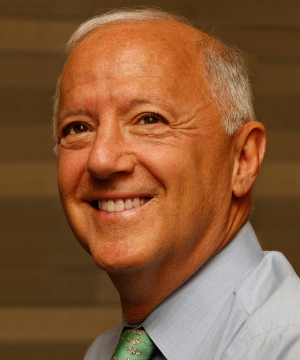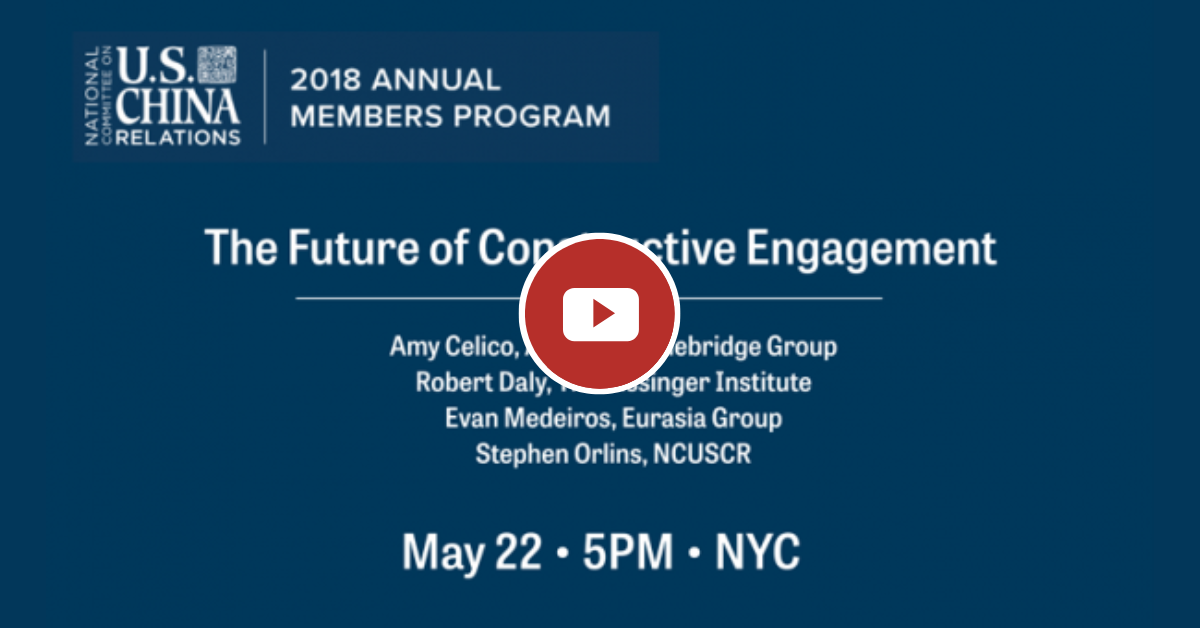Tuesday, May 22, 2018 | 5:00 PM EDT - 7:00 PM EDT
Edelman |, New York, NY
Ever since President Nixon’s groundbreaking 1972 visit to China, constructive engagement has been the guiding principle of U.S. interaction with China. This policy, which helped foster an era of peace in Asia, robust Sino-American economic ties, and China’s unprecedented development, is threatened by forces on both sides of the Pacific, and the very notion of constructive engagement is being called into question.
At its Annual Members Program on May 22, 2018, the National Committee on U.S.-China Relations focused on the recent controversy over constructive engagement. NCUSCR President Stephen Orlins led off with a speech on the issue and the role of the National Committee in this fraught time, and then moderated a panel of three specialists, each looking at constructive engagement through the lens of her/his own field.
The National Committee is grateful to its corporate member Edelman for providing the venue for this event.
Speakers/Panelists:
Economics & Trade: Amy P. Celico, Principal, Albright Stonebridge Group
Soft Power & Rising Global Influence: Robert L. Daly, Director, Kissinger Institute on China and the United States, Wilson Center
Strategic & Security: Evan S. Medeiros, Managing Director and Practice Head for Asia, Eurasia Group
Keynote & Moderator: Stephen A. Orlins, President, National Committee on U.S.-China Relations

Amy Celico
Amy P. Celico is a principal of Albright Stonebridge Group, where she leads the firm’s China team and helps clients deepen relationships with key stakeholders, succeed with M&A transactions, resolve complex problems, and build and expand their business. Prior to joining the firm, Ms. Celico served as senior director for China affairs at the Office of the U.S. Trade Representative, where she developed negotiating positions on issues related to China’s non-financial services sectors and intellectual property rights policies. Previously, Ms. Celico served as deputy director of the Office of the Chinese Economic Area at the U.S. Department of Commerce, where she monitored China’s compliance with its WTO commitments and developed U.S.-China trade policy to expand market access for U.S. companies in China. She also worked at the U.S. State Department, where she served as an intelligence analyst in the Bureau of Research and Intelligence, and as a vice consul for economic affairs at the U.S. Consulate in Shanghai.

Robert Daly
Robert L. Daly, the director of the Wilson Center’s Kissinger Institute on China and the United States, has compiled an unusually diverse portfolio of high-level work: he has served as a U.S. diplomat in Beijing; as an interpreter for Chinese and U.S. leaders, including President Carter and Secretary of State Kissinger; as head of China programs at Johns Hopkins, Syracuse, and the University of Maryland; and as a producer of Chinese-language versions of Sesame Street. Recognized East and West as a leading authority on Sino-American relations, he has testified before Congress, lectured widely in both countries, and regularly offers analysis for top media outlets.

Evan Medeiros
Dr. Evan S. Medeiros is the managing director and practice head for Asia at the Eurasia Group. Until June 2015, Dr. Medeiros served as special assistant to President Barack Obama and senior director for Asian affairs at the White House National Security Council, responsible for coordinating U.S. policy toward the Asia-Pacific across the areas of diplomacy, defense, economics, and intelligence affairs. He joined the National Security Council staff in summer 2009 as director for China, Taiwan, and Mongolian affairs and was actively involved in U.S.-China relations throughout his NSC tenure, including by developing the initial proposal for the Sunnyland’s Summit, planning the president’s 2014 summit with Chinese President Xi Jinping, and managing numerous other high-level U.S.-China interactions.

Stephen Orlins
Stephen A. Orlins has been president of the National Committee since 2005. Prior to that, he was the managing director of Carlyle Asia and chairman of the board of Taiwan Broadband Communications, one of Taiwan’s largest cable television and high speed internet providers. Prior to joining Carlyle, Mr. Orlins was a senior advisor to AEA Investors Inc., a New York-based leveraged buyout firm, with responsibility for AEA’s business activities throughout Asia. From 1983 to 1991, Mr. Orlins was with the investment banking firm of Lehman Brothers where he was a managing director from 1985 to 1991. From 1987 to 1990, he served as president of Lehman Brothers Asia. From 1976 to 1979, Mr. Orlins served in the Office of the Legal Advisor of the United States Department of State, first in the Office of the Assistant Legal Advisor for Political-Military Affairs and then for East Asian and Pacific Affairs. While in the latter, he was a member of the legal team that helped establish diplomatic relations with the People’s Republic of China. Mr. Orlins is a magna cum laude graduate of Harvard College and earned his law degree at Harvard Law School. He speaks Mandarin Chinese and is a member of the Council on Foreign Relations.
May 22, 2018 | New York City
2018 Annual Members Program
Stephen A. Orlins, President
National Committee on U.S.-China Relations
As you all know, the National Committee was founded in 1966. Remember back to that period. China’s role in the Korean War remained vivid, McCarthyism was a recent memory and thousands of Americans were dying annually in the War in Vietnam. A group of American scholars, joined by far-sighted civic, religious, and business leaders, saw the need for wide public discussion of China and its relations with the United States – recognizing that the PRC’s continued isolation might be harmful, not beneficial, to the United States.
From those early days, and throughout our history, the National Committee has been working to improve ties and understanding between our two nations. Constructive engagement has been our explicit mission. We are known for people-to-people exchanges at all levels, from the days of Ping Pong Diplomacy to our current Young Leaders Forum.
However, today we are at a point where fear and mistrust on both sides are straining those ties, creating misunderstanding, and causing some to doubt the very concept of constructive engagement. Many in the executive and legislative branches, as well as some in the think tank and academic communities in the United States argue that constructive engagement has not served the American people, and that China’s WTO accession was bad for Americans; the President’s National Security Strategy argues that China, along with Russia, are strategic competitors. Despite the fact that it is America, not China, that has withdrawn from the Paris Accords, UNESCO, and the Iran Agreement, it brands China a revisionist power. Among other ideas, they propose tariffs on Chinese goods, to restrict Chinese investment in the United States, to direct military expenditures to counter a rising China, and to limit the number of Chinese students coming to the United States. These policies destroy the foundations of the U.S.-China relationship, misdirect our priorities for the 21st century and hurt the American people. Indeed, we are at an inflection point, where commitments need to be made. Our commitment is to the values and vision of our founders, who believed that engagement was better than estrangement.
While many of these policies are based on exaggerations and distortions, in truth, it is not difficult to see why we are here. Over the past few years, the Chinese government has adopted policies that have alienated even ardent supporters of constructive engagement. In the business and trade realms, we see entire sectors closed to foreign investment, a lack of transparency in rule-making, regulatory enforcement that discriminates against foreigners, stalled Third Plenum reforms, lack of the rule of law, and high tariffs that should have been reduced decades ago. In the academic space, the denial of visas for those who write negatively about China alienates academics who believe in academic freedom. In the non-profit sector, the introduction of the international NGO management law has made it more difficult for even non-controversial non-profit organizations to operate in China. The blocking of Facebook, Google, YouTube, Twitter, The New York Times and The Wall Street Journal sows distrust among Americans who rely on these for their news and for communications. China’s reclamation and militarization of islands in the South China Sea in violation of international law lead believers in the international system to question whether China can be the responsible stakeholder that Bob Zoellick called it to become at our annual dinner in 2005.
In the United States, there are those who consistently misconstrue China’s actions and exaggerate China’s impact. Claims, for example, that America has lost 6 million manufacturing jobs to China ignores the fact that automation and technology, along with relocating jobs to Mexico, Canada, and other countries, are also important causes of job losses. The focus on bilateral trade deficits ignores the fact that in the last ten years China’s current account surplus to GDP has dropped from 9% to 1.5%. This trend more accurately reflects China’s surplus than bilateral trade statistics.
On the strategic side, the same occurs. When I was talking with a senior American military official recently, he told me, “China’s action in the South China Sea is the equivalent of Russia’s action in the Ukraine and Crimea.” His analogy vastly exaggerates what China is doing. While I believe China’s action in the South China Sea is inconsistent with international law, let’s keep in mind that more than ten thousand people died in Russia’s invasion of Ukraine. None have died in the South China Sea.
Constructive engagement has not failed. It simply needs to be rebooted to meet challenges that our founders could never have envisaged.
Let’s briefly look at the history. A few years after we engaged with China, American soldiers stopped dying in Asia and haven’t died since. Constructive engagement coupled with China’s reform and opening has lifted hundreds of millions of Chinese out of poverty. The China I moved to in 1979 required that I obtain a travel permit whenever I left Beijing to travel within China. When Chinese graduated from high school or college, the state assigned them a place to work. They couldn’t get a passport. Now 120 million Chinese travel abroad annually and those trips generate more than $33 billion for Americans.
China has grown to become the third-largest destination for American goods and services and China is the number one purchaser of American agricultural products. Our trade with China supports 2.6 million American jobs. China’s burgeoning middle class not only means that its people are living far better lives today, it also creates a huge and growing market for American goods and services. The US-China Business Council expects that U.S. exports to China to rise to more than $520 billion by 2030.
Chinese manufacturing has also lowered prices in the United States for consumer goods, dampening inflation, and putting more money in American wallets, resulting in a savings to the average American family of $850 annually. In addition, Chinese investment directly supports over 150,000 American jobs and will support hundreds of thousands more if allowed to continue.
While China still is not the responsible stakeholder we had hoped it would become by now, it has come a long way. China provides the largest number of UN peacekeepers among the permanent five member nations of the United Nations; its Belt and Road Initiative and Asian Infrastructure Investment Bank have helped fill a need for development finance that multilateral institutions have not been able to provide. Most importantly, after almost constant war in Asia for five decades, since constructive engagement, we have seen peace in the region. This is no coincidence.
Beyond the economics, though, constructive engagement has had qualitative benefits; the hundreds of thousands of Chinese students who have come to America have enriched their campuses and American life. When I hear talk of limiting visas to Chinese STEM students, I realize how destructive the current trend has become. I think of my friend Ming Hsieh who came to America from Guangzhou to study engineering at USC. After graduation, he invented a high-speed biometric fingerprint system that now supplies the Department of Homeland Security, the FBI and other agencies. If the limitations now being discussed had been in place when he came to the States, this winner of the Ellis Island Medal of Honor after whom the USC School of Engineering is named would have been prevented from studying in the United States. And his contribution to American society would never have occurred.
The purpose of constructive engagement was never to make China just like us. It is critical that we are clear-eyed about this as well as realistic about what is in our power to influence. The goal of engagement was always to help make China a productive member of the global community and here we have made substantial progress.
As China becomes more prosperous and powerful, it naturally wields greater influence in the world. This does not make us strategic competitors. It does not make confrontation inevitable. What it does demand is that we prepare for challenges to the United States that the founders of the National Committee could never have envisioned. And constructive engagement needs to adapt to this new reality. We need to honestly face the fact that, no matter what we do, China will continue its rise, and we want to do everything we can to make its rise benefit the global community.
The question is how should the United States act in light of an evolving China? When China is characterized as a strategic competitor and revisionist power and we must spend tens or even hundreds of billions to defeat and deter China, I’m reminded of the words of the great general and later President Dwight D Eisenhower: “Every gun that is made, every warship launched, every rocket fired signifies in the final sense a theft from those who hunger and are not fed, those who are cold and are not clothed.” And I would add, those who suffer from deteriorating infrastructure that is not fixed and the under educated who remain uneducated.
Domestic challenges within the United States and China, and the world’s great transnational issues – terrorism, economic crisis, climate change, pandemics, use of AI and big data to serve humankind, peace on the Korean Peninsula – cannot be solved if we treat China as an enemy. They can only be solved if we work together.
So, allow me to conclude by saying, it is time – no, it is past the time – that each and every one of you participates in this debate because it will determine our future. If you do, if you do every day as we at the National Committee do, I am convinced the U.S.-China relationship will get back on the right track because in the end it is the peoples of the United States and China that will determine the future of the most important relationship in the world.
In the coming weeks and months, the National Committee will examine how best to operate in our current environment, determining what new programs and initiatives will be most effective, and also how we can adapt established programs to meet the challenges of today. To start this conversation, we have convened a distinguished panel who will look at constructive engagement through the lens of their area of expertise: Amy Celico will address economics and trade, Robert Daly, soft power and China’s rising global influence, and Evan Medeiros, strategic and security issues. We welcome the thoughts and suggestions of those in the audience and look forward to continuing this important conversation with you.
